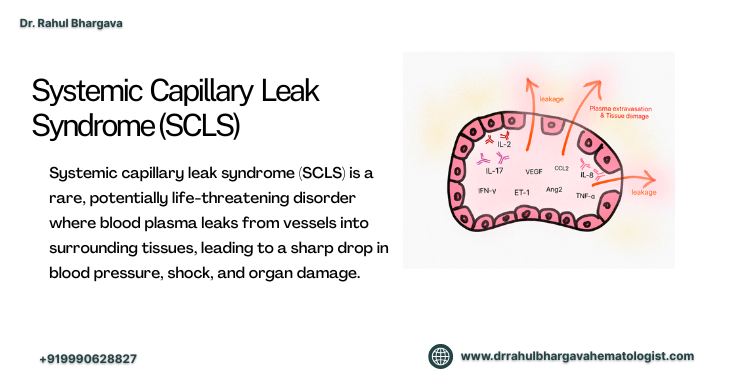Systemic Capillary Leak Syndrome (SCLS) Treatment in India

Systemic Capillary Leak Syndrome (SCLS), also known as Clarkson's disease, is a rare and life-threatening condition characterized by recurrent episodes of fluid leakage from the capillaries (small blood vessels) into surrounding tissues. This leakage results in a dramatic drop in blood pressure (hypotension), edema (fluid accumulation in tissues), and shock. SCLS is a type of vascular permeability disorder, where the walls of capillaries become abnormally permeable, allowing plasma and proteins to leak out into the interstitial space.
SCLS typically affects adults but can occur in children as well. The disease is often episodic and can occur without warning, leading to periods of severe illness followed by remission. It is considered to be a chronic condition with recurrent episodes, and it can be fatal if not managed properly.
What is Systemic Capillary Leak Syndrome (SCLS)?
Systemic Capillary Leak Syndrome, also known as Clarkson’s disease, is a rare, life-threatening disorder characterized by the sudden leakage of plasma from the blood vessels into surrounding tissues. This can lead to severe hypotension (low blood pressure), organ failure, and potentially death if not promptly treated.
Causes of SCLS
The exact cause of SCLS remains unclear, but it is often associated with viral infections, certain medications, or underlying medical conditions. The condition is thought to involve a transient defect in the endothelial cells lining the capillaries, leading to a temporary but significant increase in their permeability.
Types of SCLS:
- Idiopathic SCLS: The most common form, with no identifiable cause.
- Secondary SCLS: Occurs in association with other conditions like infections, autoimmune diseases, or malignancies.
Symptoms of Systemic Capillary Leak Syndrome
Symptoms of SCLS can vary but typically include:
- Sudden and severe swelling of the limbs (edema)
- Hypotension (very low blood pressure)
- Fatigue and weakness
- Dizziness or fainting
- Decreased urine output
- Nausea and abdominal pain
- Shortness of breath
These symptoms often occur in episodes and can escalate quickly, requiring immediate medical attention.
Diagnosis of SCLS
Diagnosing SCLS can be challenging due to its rarity and similarity to other conditions. Dr. Rahul Bhargava utilizes a combination of the following diagnostic tools:
- Clinical History & Examination: Detailed patient history and physical examination.
- Blood Tests: To assess blood protein levels and electrolytes.
- Imaging Studies: To evaluate the extent of fluid leakage and organ involvement.
- Biomarker Analysis: Testing for specific markers that may indicate endothelial dysfunction.
Treatment Options for SCLS
SCLS is a medical emergency and requires prompt treatment to prevent life-threatening complications. The treatment approach includes:
- Intravenous Fluids and Medications: To stabilize blood pressure and replace lost fluids.
- Plasma Expanders: To maintain blood volume and prevent shock.
- Immunoglobulin Therapy (IVIG): Often used to prevent recurrence of SCLS episodes.
- Long-term Management: Includes monitoring and preventive strategies to avoid triggers and manage symptoms.
Cost of Treatment and Stay in India
The cost of treating Systemic Capillary Leak Syndrome (SCLS) in India is considerably lower compared to many Western countries, making it an appealing option for medical tourists. The total cost can vary based on the severity of the condition, the required treatments, and the duration of hospitalization. Below is an overview of the approximate costs:
-
Initial Consultation with Specialist:
USD: $50 – $150
INR: ₹3,700 – ₹11,000 -
Blood Tests and Diagnostic Imaging:
USD: $100 – $500
INR: ₹7,400 – ₹37,000 -
Intravenous Fluids and Medications (per day):
USD: $50 – $200
INR: ₹3,700 – ₹14,800 -
Immunoglobulin Therapy (IVIG) (per session):
USD: $500 – $2,000
INR: ₹37,000 – ₹1,50,000 -
Hospital Stay (per night):
USD: $50 – $300
INR: ₹3,700 – ₹22,200 per night
India offers affordable and advanced medical care for treating SCLS, with high-quality hospitals equipped with the latest technologies. The cost of treatment is significantly lower than in many Western countries, while still ensuring effective management of this rare and life-threatening condition.
Frequently Asked Questions
SCLS is a chronic condition, but with proper management, the frequency and severity of episodes can be significantly reduced.
Episodes can last from a few hours to several days and require immediate medical attention.
While there is no sure way to prevent SCLS, certain medications like IVIG can help reduce the frequency of episodes.
SCLS episodes can be triggered by a variety of factors, including infections, stress, vigorous exercise, certain medications, and sometimes without any identifiable trigger. Identifying and avoiding potential triggers is crucial for managing the condition effectively.